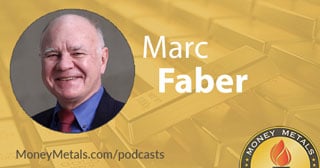9:12 AM Currencies to Collapse against Precious Metals, Investors Must Diversify | |
Well now, without further delay, let’s get right to this week’s exclusive interview.
Mike Gleason: It is my privilege now to be joined by a man who needs little introduction, Marc Faber, editor and publisher of the Gloom, Boom and Doom Report. Dr. Faber has been a long-time guest on financial shows throughout the world and is a well-known Austrian school economist and investment advisor, and it's a tremendous honor to have him back on with us today. Dr. Faber, thank you so much for joining us again, and how are you? Dr. Marc Faber: Fine, and that it's a pleasure for me to participate in this interview. Mike Gleason: Well Marc, we'll start out today with everyone's favorite topic, that being Fed policy and what's happening there because it continues to be such a key driver for everything, much to our dismay. The markets have been so addicted to Fed stimulus and cheat money since the Great Recession a decade ago, so is it possible that they can withdraw this stimulus? Or did we just learn over the last few months… going back to, say, November and December when we saw the equity market suffer dramatically over the idea of the Fed moving forward with those three to four planned rate hikes for 2019, after which the Fed has reversed course and completely backed off on any rate hikes this year… are we just looking at never-ending stimulus from the central banks now, Marc? What are you thinking as you've watched the events unfold over the last few months with respect to monetary policy and this apparent sea change? Dr. Marc Faber: Well, it's a complex issue. It's particularly complex at the present time because the global central banks, I mean the major central banks, they can argue, well, there is little inflation in the system, and so we can continue to print money or to purchase assets, which, either way, is true. There is little consumer price inflation, partly because the economy of ordinary people is not particularly good. We have a split economy. The economy of the well-to-do or extremely well-to-do people is doing well, and the economy of the ordinary people in Europe, in Japan, in the U.S., is not doing well. And so there is little inflationary pressure, but there is a lot of inflation, or has been a lot of inflation in asset prices. Stocks are at highs in the U.S. essentially, not the oil industries but several industries. And we have now 10 trillion-dollar worth's of bonds in the world that have negative interest rates, it’s in some kind of a bubble, or a big bubble. And so we have this asset inflation, and in my view, the central banks and the policy makers, they realize that if the asset bubble really breaks, if the stock market drops 20%, if home prices drop 20%, if bond prices go down 20% or so, the whole world is in a depression. So, I think that when they started actually in 2008, with QE1 in December 2008, and I was asked at the time, "How do you think it will end?" I said, "They just started QE unlimited. I think they will continue to print money until the system breaks.” And that can take another few years. But I think, yeah, it's likely, if you were to look at the political landscape, you have on the one end the Republicans, at the present time under the leadership of Mr. Trump. He wants to spend on defense and on his wall and on all kinds of things. And the Democrats, they also want to spend on all kinds of things. So, you can be sure that the deficit in the U.S. will remain around a trillion dollars a year for the foreseeable future. And in my view it's more likely that this deficit will go up, and possibly quite substantially. So, the money printing, in my view, will continue. Now could you have QE, and at the same time the Fed raising interest rates? That is a possibility. But in the current environment, where the economy has been slowing down, I think they will rather do nothing, especially also under the pressure from the White House, which essentially accuses, or tells the world that if the Fed hadn't raised interest rates, the stock market would be much higher. So, I think they will not increase rates further. I think they will not cut the rates, as Trump and Kudlow would suggest, to simply show them that they're independent, and that they don't need Mr. Trump and Mr. Kudlow to tell them what to do.
Check out the full podcast article here: https://bit.ly/2IAsbo2 | |
|
| |
| Total comments: 0 | |
